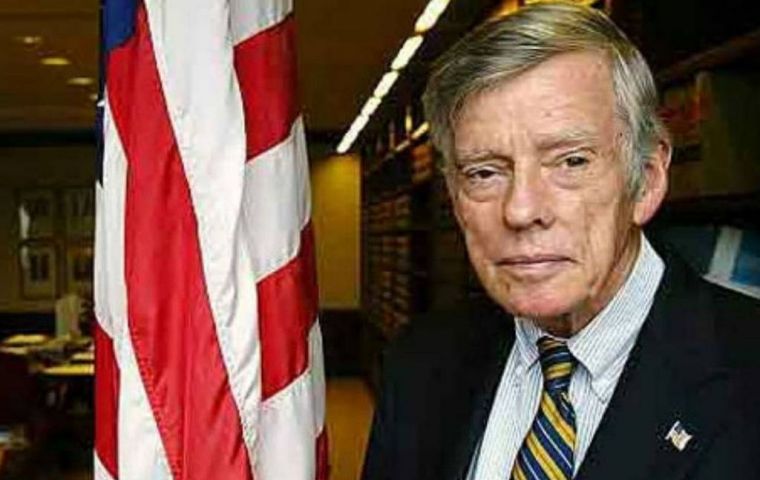MercoPress. South Atlantic News Agency
“The muddled case of Argentine bonds”, as seen by New York Times
 “Only now is Judge Griesa learning how complicated life can be for a judge seeking to control actions by a sovereign government”
“Only now is Judge Griesa learning how complicated life can be for a judge seeking to control actions by a sovereign government”  For Anna Gelpern, a law professor at Georgetown University, what is happening days before a payment default is “scary”
For Anna Gelpern, a law professor at Georgetown University, what is happening days before a payment default is “scary” The following piece was written by Floyd Norris, financial analyst from The New York Times and refers to the complicated process that has emerged from the ongoing battle between Argentina and the holdouts demanding full payment of sovereign bonds, plus accrued interests.
Thomas Poole Griesa has been a federal judge for 42 years. He has been grappling with Argentina’s debt default for a decade.
Only now is he learning how complicated life can be for a judge seeking to control actions by a sovereign government and issuing orders that are supposed to be binding on those who would ordinarily never be within the jurisdiction of an American court.
“We are in the soup,” he said at one point on Tuesday during the latest hearing in a case that has shaken the world of sovereign debt restructuring.
He was referring to the prospect of a new Argentine default on its sovereign bonds, something that seems almost certain to happen on Wednesday. But he could have been referring to the process he unleashed with rulings that were meant to accomplish one thing — force Argentina to live up to what he repeatedly called its “obligations” — but failed to take into account just how complex the situation is. This week’s hearing made clear that he had not completely understood the bond transactions that he had been ruling on for years.
Argentina defaulted on its debt in 2001 and took an imperial attitude toward aggrieved creditors. In 2005, it offered a take-it-or-leave-it exchange of new bonds for the old ones, with investors required to accept large losses. Then in 2010 it told investors who had held out that they would have one more chance to take the exchange bonds. Most did, but some, largely hedge funds, did not and demanded full repayment. Argentina vowed that those investors who refused would never receive a dime.
Then came Judge Griesa, who was chief judge of the United States District Court for the Southern District of New York until 2000, when he became a senior judge.
Other judges had ruled that Argentina owed the money, but those rulings were, in practice, unenforceable against a sovereign state. Judge Griesa came up with a legal interpretation to put teeth in the rulings. He held that Argentina must pay the old bonds in full at the same time it made the next semiannual interest payment to holders of the new bonds. And if it did not do so, any bank that helped Argentina pay interest on the new bonds would be violating the order.
That ruling was upheld by the United States Court of Appeals for the Second Circuit, and in June the Supreme Court refused to hear Argentina’s final appeal.
In Argentina’s debt restructuring, holders of the old bonds who accepted the country’s offer received a variety of new bonds depending to some extent on which old bonds they held and to some extent on which new bonds they chose. Some of the exchange bonds were denominated in United States dollars, some in Argentine pesos, some in Euros and some in Japanese yen. Some of them were subject to New York law, others to Argentine, English or Japanese law.
And that is where the complexities arose that Judge Griesa seems not to have understood.
The order he issued earlier this year said that — assuming Argentina does not make good on the old bonds — it should not make interest payments on the exchange bonds, and banks should not help it do so. That sounded as if it covered all the exchange bonds, even those not issued under New York law.
But the opinion explaining the order discussed only the dollar bonds issued under New York law. It ignored the existence of other exchange bonds.
So did the ruling apply to those other exchange bonds, including those issued under Argentine law? Would a bank that processed interest payments on those bonds be in trouble with the judge?
Citibank’s Argentine branch, which is the trustee for bonds issued under Argentine law, some denominated in pesos and some in dollars, asked the judge for a clarification, and on June 27 he provided one. Citibank could process interest payments on those bonds. They were not covered by his order.
This week’s hearing was largely about changing that ruling, and the judge initially made it clear that he saw no reason for a change. He saw the bonds as domestic ones, owned by Argentine citizens. “From a practical, common-sense standpoint,” he asked a lawyer for the hedge funds who was trying to have the order modified, “why do they have to get dragged into this?”
It turned out that he did not know much about those Argentine-law bonds. He said his June order provided “a rather minute exception” to his original ruling, and told the hedge funds’ lawyer, Edward A. Friedman of Friedman Kaplan Seiler & Adelman, “It is my understanding that the bonds being talked about in your motion are not part of the exchange.”
Told that the bonds in question were exchange bonds, and that they accounted for nearly a quarter of all the exchange bonds, he said he had not realized that and reversed course.
“Sitting here right now,” he said, “it strikes me that, being exchange bonds, they should be treated as exchange bonds and that they should be included with the other exchange bonds in the Feb. 23 order.”
It was not bad theater, but it hardly inspired confidence in the American legal system.
“These questions are essential to the operation of this injunction,” Anna Gelpern, a law professor at Georgetown University who has followed the case for years, said after reading the transcript of Tuesday’s hearing. “Up to half the debt could be in or out depending on how these questions are resolved. The fact we are confronting them, days before a payment default, is scary.”
It is not as if no one had pointed out the issues in the many legal briefs and arguments filed in this case, both before Judge Griesa and before appeals courts. But those arguments seem not to have registered. “For this to come out after this has gone through so much legal process, in the most sophisticated financial jurisdiction in America,” Ms. Gelpern said, “has to be astounding.”
On Tuesday, Judge Griesa eventually decided he would think it over and rule at a later date. At some point he will also have to deal with the status of bonds issued under English or Japanese law.
If he ends up ruling that the Argentine-law bonds are covered by his original ruling, and tells Citibank not to process the interest payment, then Citibank could have to decide whether to defy him or ignore the law in Argentina, where it could face prosecution.
If he rules the other way, Argentina may try to find a way to do a new exchange, with Argentine-law bonds given to any investors who want to give up their bonds issued under United States law. The judge would probably try to block such an exchange.
A grace period gives Argentina until Wednesday to pay the interest it owes on the exchange bonds. It has paid the money to the bank trustees, including Bank of New York Mellon for the New York-law bonds. That bank has done nothing with the money because it is clearly bound by the judge’s order.
Argentina says that payment means it will not default, because it will not be the country’s fault if the exchange bond holders are not paid. The judge says Argentina acted illegally in making the payment, but he has not decided what the Bank of New York Mellon should do now. The hedge funds want the judge to order the bank to return the money to Argentina. The bank, fearing suits from bondholders, wants to keep the money until all this is sorted out. The judge is also pondering that issue.
As Wednesday approaches, the judge has a lot to think about. It would be better if he had done some of that thinking before he issued his order, or if the appeals court or the Supreme Court had forced him to do so.




Top Comments
Disclaimer & comment rules-

-

-

Read all commentsA brief synopsis of the article is....
Jul 25th, 2014 - 06:51 am 0..apparently this judge hasn't got a clue what he is doing and hasn't for the last 12 years...
to make an informed judgement...one really should be informed...
...scary
He appears to have interpreted the Law and it's intent correctly, and is applying it appropriately.
Jul 25th, 2014 - 08:20 am 0However, the difficulty is the possible conflicts of jurisdiction - quite a challenge to make it can be enforced in good conscience.
Not an easy case.
This article reeks of ageism - certainly in 42 years, this Judge has acquired a great deal of experience and seen many precedents.
Don't lawyers like to make simple things complex? Which jurisdiction were the bonds issued under? Where has argieland illegally deposited the money? Who was jurisdiction. Case closed. Pay up, argieland!
Jul 25th, 2014 - 09:48 am 0Commenting for this story is now closed.
If you have a Facebook account, become a fan and comment on our Facebook Page!